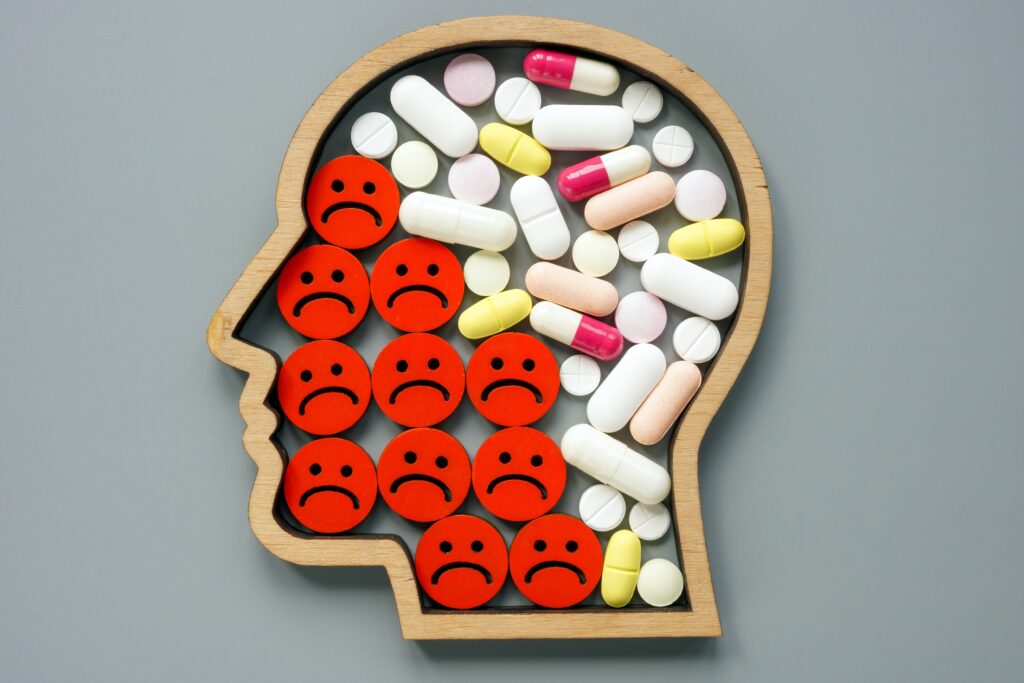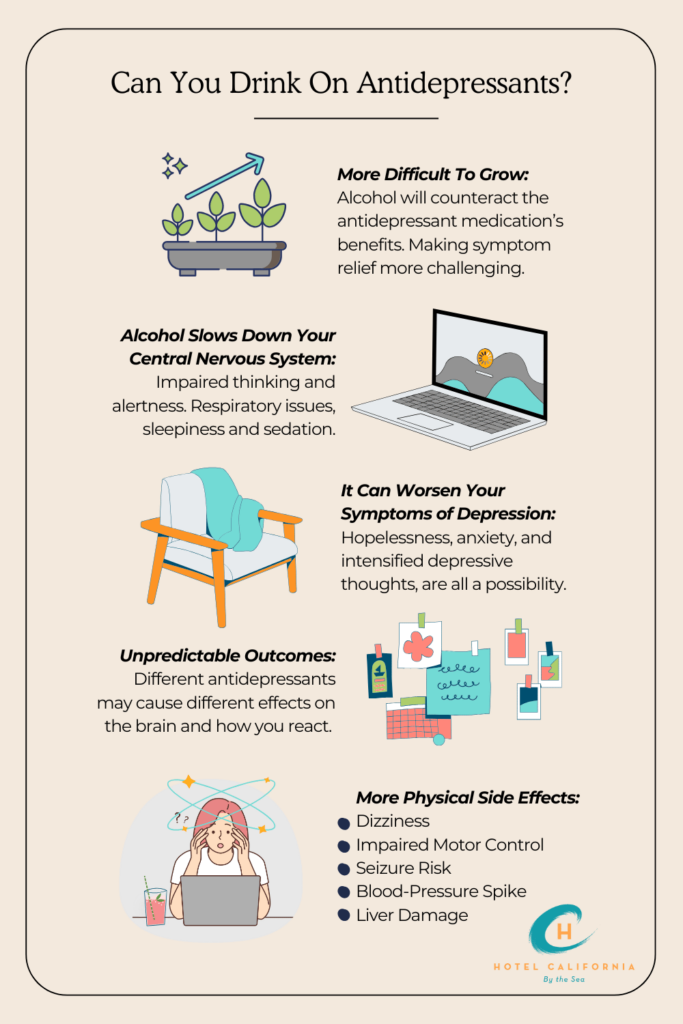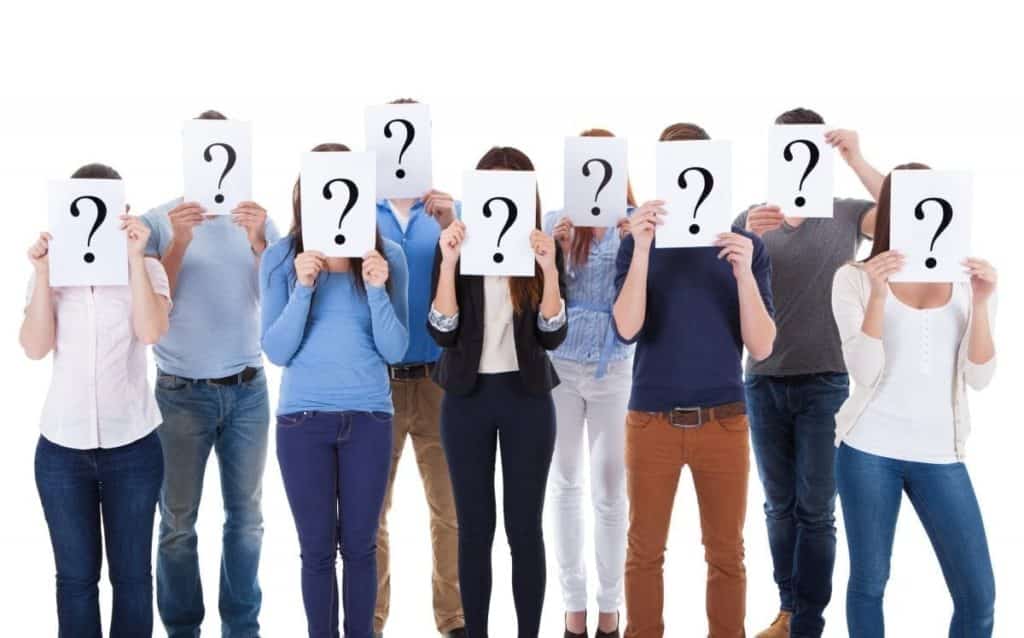Can you drink on Antidepressants?
Can you drink on antidepressants? Antidepressants are generally prescribed to help in the treatment of anxiety, depression, panic and other types of mood dysregulation. Alcohol is a substance that often produces feelings of anxiety and depression. When the two are combined, it can lead to unpredictable outcomes.

Alcohol should be avoided when on any type of antidepressant medication. It can only worsen and complicate your symptoms. Alcohol and anxiety medicine do not mix. When drinking alcohol on antidepressants, you can run the risk of intensifying the depression and mood disorder that is being treated with prescription medication.
Not only can it dull the effects of the medication, it can make feelings of depression and anxiety much worse. The primary danger of polydrug use like alcohol and antidepressants is the risk of increased and amplified effects. Both substances can cause drowsiness, dizziness, decreased awareness and reaction time and difficulty concentrating. When taken together, these effects are heightened.
What are Antidepressants?
Antidepressants are prescription medications that manipulate the chemical balance in the brain. They act on the central nervous system and are a long-term treatment plan for those struggling with mood dysregulation such as generalized anxiety disorder, depression, panic disorder, OCD, PTSD and social phobias. Antidepressant medications usually take full effect around the 2-4 week mark. This is when the user will begin to see results and changes in their mood and thinking.
Antidepressants work by increasing or restoring levels of neurochemicals. These chemicals such as serotonin, norepinephrine and dopamine, help regulate mood and behaviors by increasing communication between the brain cells. When there is an imbalance in these chemicals, it is what causes mood disorders.
There are many types of antidepressants. Each antidepressant addresses a different type of chemical shortage or surplus in the brain.

Types of Antidepressants
- SSRIs – Selective Serotonin Reuptake Inhibitors. These are the most commonly prescribed types of antidepressants. It affects the serotonin brain chemical. Serotonin is a feel-good chemical. This medication prevents the brain from reabsorbing serotonin at its normal rate. It causes an excess buildup of chemicals leading to feelings of content and pleasure. Examples of SSRIs include Prozac, Zoloft, Lexapro and Paxil.
- SNRIs – Serotonin and Norepinephrine Reuptake Inhibitors. This type of antidepressant stops the brain from cleaning up both serotonin and norepinephrine which occur naturally in the brain. Norepinephrine enhances awareness and focus. It allows the brain to easily create and recall memories. Both chemicals are important and serve necessary functions in the brain. Examples of SNRIs include Pristiq, Cymbalta, Effexor XR and Ultram.
- TCAs – Tricycle Tetracycle Antidepressants. These medications work by blocking the reuptake of serotonin and norepinephrine. They also block other chemicals from being reabsorbed. This can cause various side effects compared to other types of antidepressants. Examples of TCAs include Elavil, Sinequan and Tofranil.
- MAOIs – Monoamine Oxidase Inhibitors. These antidepressants work by interfering with the enzymes in the brain that clear out the feel-good chemicals. It stops the brain from removing serotonin and norepinephrine while keeping dopamine. They block the reuptake of serotonin, norepinephrine and dopamine. Examples of these antidepressants include Marplan, Nardil and Parnate.
- Atypical Antidepressants – This classification of prescription medication includes multiple types of drugs that work in different capacities. They all manipulate levels of neurotransmitters in the brain, but they do not work similarly to the way other antidepressants do. Examples of atypical antidepressants include Wellbutrin and Trazodone.
Can you drink on Antidepressants?
When drinking alcohol with antidepressants, both substances can create dangerous effects on the brain. It is not recommended to drink while taking this type of prescription medication. According to the National Alliance on Mental Health (NAMI), alcohol can worsen your symptoms of anxiety and depression because it slows down your central nervous system and increases your risk of suicidal thoughts.
There is no information or clinical evidence showing that any amount of alcohol can be safe when taken alongside antidepressants. Oftentimes, people with mental health disorders such as anxiety and depression turn to alcohol to temporarily distract them from managing their feelings. However, it is only a short-term solution. With long-term use, alcohol can worsen symptoms of depression. It does the opposite of antidepressants which are trying to help change those feelings.
Check Your Insurance Coverage for FREE
Find out if your insurance covers addiction treatment in minutes. We accept most insurance!
Common side effects of Alcohol and Anxiety Medicine
Some of the most commonly experienced side effects of using alcohol and anxiety medications and antidepressants include impaired alertness, dizziness, impaired motor control, intensified depressive thoughts, hopelessness and increased risk of overdose.
It can also cause worsening depression and anxiety. Alcohol will counteract the benefits of your antidepressant medication and make your symptoms even more difficult to treat. In turn, this will increase symptoms of depression and anxiety.
Different types of antidepressants react differently with alcohol.
When drinking alcohol with SSRIs, users can experience more pronounced drunkenness. When drinking with SNRIs, users can experience worsened liver damage. When drinking while on TCAs, the polydrug use can worsen depressive symptoms and increase intoxicating effects. When drinking alcohol while on atypical medications, it can increase the risk of seizures. Alcohol and MAOIs are the most dangerous combination. It can spike blood pressure and cause other life-threatening side effects.
Antidepressants and Alcoholism
There are many risks to mixing antidepressants with alcohol. The combination of both can create an effect on your brain and how you react can depend on many different factors. Factors such as age, medical history and other medications you may be taking at the time. Polydrug use of antidepressants and alcohol can be more dangerous for some compared to others who are at more risk of worsening side effects.
- Worsening side effects. Many medications can cause issues when they are taken alongside alcohol. This includes anxiety medications, antidepressants, sleep medications and prescription pain medications.
- Impaired thinking and alertness. The combination of both alcohol and antidepressants can impact cognitive functions like judgment, coordination and motor skills even more than using just alcohol alone. It can affect the ability to drive or do others tasks that require your full attention.
- Becoming sedated or sleepy. Some antidepressants cause sedation. Alcohol causes sedation. When used together, it can dangerously sedate a person to the point where they are unable to function properly.
- MAOIs should not be taken with alcohol. The combination of these two substances can be dangerous. MAOIs are one of the least prescribed antidepressants due to their safety concerns around food and drug interactions. It can cause dangerous spikes in blood pressure that require emergency medical attention. Because of this, drinking alcohol while on this medication is extremely dangerous.
- Liver damage. Liver damage occurs from liver toxicity. Alcohol is metabolized in the liver. Some antidepressant medications are also metabolized in the liver. When they are both being processed at the same time, it can put strain on the organ, causing it to work overtime.
Reach out to Hotel California by the Sea
We specialize in treating addiction and other co-occurring disorders, such as PTSD. Our Admissions specialists are available to walk you through the best options for treating your addiction.
Treatment for Polydrug Addiction
The combination of alcohol and antidepressants can be a dangerous one with severe and intensified side effects. Both drugs only exacerbate each other’s symptoms and at the same time, can counteract the effects of one another. Alcohol is a depressant drug that affects the central nervous system. Some antidepressants are also depressant drugs that affect the central nervous system. The use of both can cause an addiction to one or another. This is also referred to as polydrug abuse.
Hotel California by the Sea provides treatment for alcohol use disorder, substance use disorder and polydrug abuse. We offer treatment at all levels of care including detox, residential, PHP and IOP. We utilize evidence-based treatment methods such as CBT, DBT and EMDR therapy. Hotel California by the Sea is dedicated to helping clients in their goals of sobriety and overcome their addictions.
References:
https://www.alcoholhelp.com/alcohol/drinking-drugs/antidepressants
https://www.addictioncenter.com/alcohol/alcohol-antidepressants
https://www.goodrx.com/conditions/depression/drinking-while-taking-cymbalta-amitriptyline
https://share.upmc.com/2021/09/alcohol-and-antidepressants
https://mcpress.mayoclinic.org/mental-health/dangers-of-mixing-antidepressants-and-alcohol/


